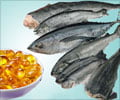Its now actually bye bye to cod, skate and haddock and hello, blackbelly rosefish, John dory and splendid alfonsino.

Biologists on Thursday report that warmer seas are causing a remarkable turnover in commercially-caught species off Britain, Belgium, Denmark, Ireland, Germany, the Netherlands and northwest France.
Cold-water species such as the Atlantic cod that were a staple two generations ago are losing out but warm-loving species such as the dab and John dory are doing well, their study suggests.
The paper analyses 11 surveys of catches of bottom-trawled fish in a million square kilometres (425,000 square miles) on northeastern Europe's continental shelf, comprising the North Sea, Irish Sea and the northern Bay of Biscay.
Relatively shallow, these seas have warmed by between 0.72 and 1.31 degrees Celsius (1.3-2.4 degrees Fahrenheit) over the 28 years from 1980-2008, or four times the global average.
To the lay person, a warming of this magnitude may seem trivial. But temperature has a big impact on maturation of fish eggs, the growth and survival of larvae and on the plankton on which fisheries ultimately depend.
Advertisement
Catches of cold-loving species dropped by half but those of warm-loving species doubled.
Advertisement
"This means more small-bodied, faster-growing species with shorter generation times, and potentially more diversity."
The data is based on roughly 100 million fish from 177 species that were brought in by commercial trawlers.
Several species, especially cod, have been hammered by over-fishing since the end of World War II.
But Simpson said the study had not been skewed by using catch data.
His team used a "grid" approach, which was able to zoom into small areas of sea to look at catches species by species and year by year, and see how this compared with the local change in sea temperature.
That way, the impact of fishing could be taken into account in calculating populations, he said.
"The most intense fishing in European waters happened really between 1950 and 1980. It has fallen quite substantially since then as a result of the (European) Common Fisheries Policy," Simpson told AFP by phone.
"We're certainly convinced that what we're seeing is a response to warming, not to fishing."
Simpson added that, over time, with strong management and a smart response to consumer demand, European seas had the potential to be a good and sustainable fishery in a warmer world.
He noted that fishermen in the southwestern English county of Cornwall were already exploiting a market for the once-exotic red gurnard.
"Five years ago, they sold it for 50 pence (77 US cents, 57 euro cents) a fish to crab fishermen for their pots as bait. Now it's sold to gourmet restaurants for five pounds (7.2 dollars, eight euros) a fish."
The study appears in Current Biology, one of the US-based Cell group of science journals.
Source-AFP














